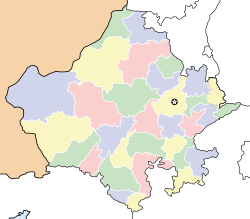Makrana
From Wikipedia, the free encyclopedia
| Makrana | |
| — city — | |
| Coordinates | 27°03′N 74°43′ECoordinates: 27°03′N 74°43′E |
| Country | India |
| State | Rajasthan |
| District(s) | Nagaur |
| Population | 83,289 (2001) |
| Time zone | IST (UTC+05:30) |
| Area | • 408 metres (1,339 ft) |
Makrana is a town in the Nagaur district of Indian state of Rajasthan. Makrana is famous for the white stone as marble mined from the mines around it. It is said that the Taj Mahal was built from Makrana marble. Makrana is a small town, but it has plenty of marble outcrops. Most of the residents in this town work as marble miners.
Contents[hide] |
[edit]Geography
Makrana is located at 27.05°N 74.72°E[1]. It has an average elevation of 408 metres (1338 feet).
[edit]Economy
The town is well linked to railroads and other forms of transportation.
Known for its white marble reserves, Makrana is a small town in Nagaur district, with a deposit of 56 million tonnes and 40,000 labourers working in 400 mines in the several ranges of the Aravallis. Makrana, along with Rajsamand, are the main centres of marble in Rajasthan. Calcitic in nature, Makrana Marble is regarded as the oldest in age and finest in quality[1].
The present rate of marble production from Makrana is 1.20 lakh tonnes per year with an annual revenue of Rs 36 crore.
Makrana is source of employment to at least 1 Lac people of about 100 surrounding villages. The famous Victoria Memorial of Kolkata, the world famous Taj Mahal in Agra, Raudat Tahera in Mumbai and Jain Temple of Dilwara in south Rajasthan are built from Makrana Marble.
[edit]Mining
Makrana has various mining ranges, popularly known as Doongri, devi, Ulodi, Saabwali, Gulabi, Kumari, Neharkhan, Matabhar, Matabhar kumari, Chuck doongri, Chosira etc.
Doongri, devi, Saabwali, Ulodi, Chosira and Neharkhan are famous for white marble, whereas Ulodi is famous for Albeto Marble. These mines produce white-brown belt beautiful marble. Gulabi stands for pink plain and pink Adanga marble whereas almost all mines produce Adanga marbles with brown and grey shades.
Makrana marble is a metamorphic rock. It is a single deposit in India. The Makrana marble has 90 to 98 percent CaCO3.[citation needed]
[edit]Demographics
As of 2001 India census[2], Makrana had a population of 83,289. Males constitute 52% of the population and females 48%. Makrana has an average literacy rate of 55%, lower than the national average of 59.5%: male literacy is 65%, and female literacy is 44%. In Makrana, 20% of the populatiocontekt
[edit]References
- ^ Falling Rain Genomics, Inc - Makrana
- ^ "Census of India 2001: Data from the 2001 Census, including cities, villages and towns (Provisional)". Census Commission of India. Archived from the original on 2004-06-16. Retrieved 2008-11-01.
| ||
| |||



No comments:
Post a Comment